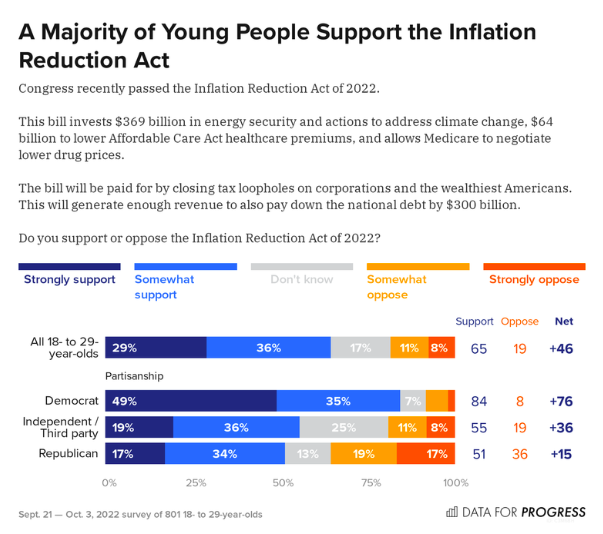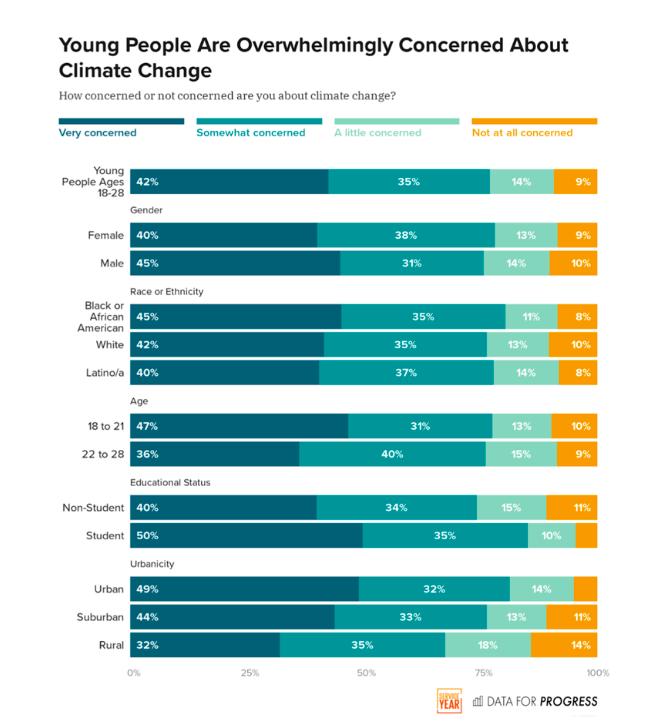Resources
Search below for resources covering the intersection of climate engagement, social science and data analytics.
RESULTS
Environmental Polling Roundup - November 18th, 2022
This post includes climate and environment headlines, data points, and key takeaways from recent public polls - including lots of new polling on climate change and the environment as issues in the midterm elections.
Communicating climate justice with young adults in Europe
Most young adults in Europe want to be involved in action to tackle climate change and have little faith in current leaders to take significant climate action. To best communicate with young adults, build awareness and understanding of what climate justice really means, use language that connects rather than divides, and focus on ideas, inspiration and infrastructure for building action. Survey results show that almost one in 10 respondents said they would be prepared to break the law to tackle climate change, and a large majority (81%) agreed that we need a social transformation – changing our economy, how we travel, live, produce and consume – in order to tackle climate change.
Environmental Polling Roundup - October 21st, 2022
This post includes climate and environment headlines, data points, and key takeaways from recent public polls - including new polls focusing on voters of color, young people, and Latinos.
Poll: No Generation Without Representation: A Survey of Young Americans
Overwhelming majorities of young Americans are concerned about climate change, extreme weather, and pollution impacting their communities. Less than one-third say that the U.S. is on the right track in addressing climate change. 64% of young Americans aged 18-29 believe that increasing domestic production of clean energy like wind and solar would be effective towards addressing climate change. 62% of young Americans aged 18-29 believe that enforcing stricter rules around corporations’ climate pollution would be effective towards addressing climate change.
Grassroots Guide: Navigating Turnover In Activist Groups
There are some key strategies that grassroots groups can employ to avoid dissolving. These are especially helpful for student-run groups, which can struggle to pass along the group's resources and knowledge to the next generation of student organizers, as many lack a permanence of structure. These strategies include: support and guide new members via training and upskilling; build institutional memory; create a blueprint for group operations; have strong onboarding and outboarding processes; institutionalize involvement; engage with the student association/body; get teachers to support your campaign(s); outline institutions in your school; get support from staff unions; and create solidarity with staff causes. This report describes these strategies in detail. Some specific challenges by student groups have included: divestment organizers were concerned about groups who won and didn’t know where to go from there; groups have been struggling to navigate online organizing; there are ongoing concerns related to general turnover and capacity when students graduate (particularly those who have been members of a group for a while; a lack of support from former members leads to more energy and time needed to restart after a high rate of turnover; anger towards the school administration leads to forgetting about turnover periods, thus the workload for the next semester is larger.
Growing Voters: Building Institutions and Community Ecosystems for Equitable Electoral Participation
There are some key ways to improve on the current model for how to engage young people to vote. This report introduces and details a new framework for how institutions and communities can prepare young people—starting long before they turn 18—to become active and informed voters. There are profound inequities in access to civic learning and engagement opportunities for young people. Implementing a “growing voters” approach involves engaging potential (young) voters year-round, building culture of the importance of civic participation, contacting potential voters even before they turn 18, targeting young people who even haven’t voted before, and doing so everywhere (national and locally, not just in competitive electoral districts). This report describes these tactics in detail, for how to produce a long-term increase in young people voting.
With six months until the 2022 election, most young voters are frustrated with the lack of progress and pessimistic about the future. Voters under 35 say things are not going well with respect to virtually every issue facing their generations, from the economy and health care costs to abortion rights and climate change. Just 22% believe things are excellent or good with regard to climate change. Further, 80% support “Reducing carbon emissions and addressing the impact of climate change.” With few exceptions, they don’t trust either political party in the country to handle their concerns. 90% say things in the country are on the wrong track. Overwhelming majorities of young people say that things are not going well with respect to each issue area tested in this survey, with the exception of the right to vote (55% positive, 45% negative) and protecting LGBTQ rights (split 49% positive, 51% negative). They are the most negative about money in politics (5% positive) and healthcare costs (7% positive). There are some notable differences in assessments of problems by gender and race/ethnicity. These young voters overwhelmingly say the trust the Democratic Party more than Republican Party with many issues. This poll asked more questions about assessments of problems and policies.
Poll: Transforming Young People’s Climate Concern into Climate Action
The Civilian Climate Corps (CCC) is strongly appealing to young Americans, who are deeply concerned about climate change but not sure what they can personally do about it. The poll finds that 77% of young Americans aged 18-28 are concerned about climate change. However, when asked about actions they are taking to address climate change, 65% say they “care about climate change” but aren’t sure what they “can do personally to make a difference.” After reading a brief description of the CCC proposal, including its pay (at least $15/hour) and benefits (health care and educational assistance), young Americans support the idea by a resounding 72%-9% margin. Additionally, 38% of young Americans say they would consider joining the Civilian Climate Corps if a position was available to them.
Environmental Polling Roundup - April 29th, 2022
This post includes climate and environment headlines, data points, and key takeaways from recent public polls - including new polling on the impact of extreme weather on climate attitudes, the current energy crisis, the clean energy transition, and Gen Z Americans’ perspectives on climate and the environment.
Poll: Climate change, increase in wildfires worry a majority of Nevadans
A majority of Nevadans are concerned about the impact of global warming, especially when it comes to the rise in wildfires in the West and resulting poor air quality.
- That sentiment is strongest in Washoe County, where the past two summers have been smoke-filled due to catastrophic wildfires in California. Almost all Washoe County residents polled have concerns about wildfires and resulting air pollution.
- More than half of those polled in Clark County and nearly two-thirds of those in Washoe County said climate change impacts them daily, including 69% of Black respondents.
- 78% of those aged 18-24 agreed climate change is impacting their lives, while less than half of those aged 65-74 agreed.
- The lone segment of Nevadans who did not report seeing a daily impact due to climate change was rural Nevada, where more than three-quarters said global warming doesn’t impact them.
- Nevadans on both sides of major political party lines are united by concern about the recent rise in the size, frequency and severity of wildfires — 95% of Democrats and 72% of Republicans agreed it’s a problem.
- While wildfire concerns span party lines, concerns about air quality do not — 90% of Democrats are concerned, as opposed to only 48% of Republicans.
Pagination
- Previous page
- Page 3
- Next page





